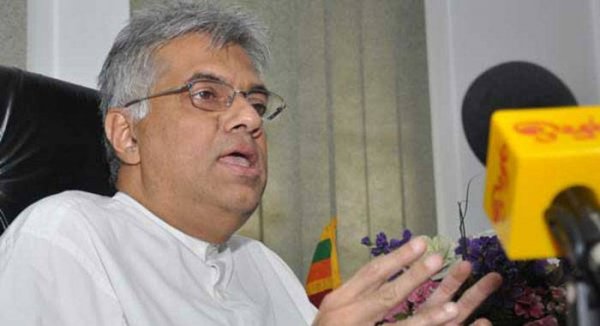Sri Lankan Prime Minister Ranil Wickremesinghe
During his four-day visit, he gave his word to Chinese Prime Minister Li Keqiang to join their ‘one road, one belt’ initiative while looking at promoting Sri Lanka as a trade hub in the Indian Ocean.
Speaking to media in Beijing, he said: “Our aim is to make Sri Lanka an economic hub of the Indian Ocean and we are ready to seek more economic cooperation with China.”
A joint statement issued on April 9 at the conclusion of his China visit said: “The two sides will use the development of a 21st Century Maritime Silk Road as an opportunity to further advance infrastructure development, the China-Sri Lanka Free Trade Agreement negotiations, promote joint ventures and expand cooperation in the areas of economy, culture, science and technology and people-to-people contacts to ensure that development brings benefits and more deliverables to the people and to build a community that have a shared destiny.”
Wickremesinghe utilized the visit to seek an equity swap of $8 billion Sri Lanka owes China and offered to sell its stakes to Chinese companies. The move comes as the country’s foreign reserves continue to plunge to a new low of $6.2 billion in March from $6.5 billion in February.
Surprisingly, former President Mahinda Rajapaksa hailed his China visit.
“It’s important to maintain good relationships with neighboring countries. Even though the current government blamed me for seeking Chinese assistance for development projects, today they too have turned to China,” Rajapaksa said.
The controversial $ 1.5 billion worth Colombo Port City Project took center-stage during Wickremesinghe’s visit. Both countries inked seven agreements covering areas of trade and investment, science and technology, health, and judiciary, among others.
Allaying the fears of India over the port city project, Wickremesinghe said it will not pose any threat to other countries.
“It’s an opportunity for everyone to make money,” he told reporters in Beijing.
Initially, he had vowed to scrap the project owing to environmental concerns. According to him, the then president Rajapaksa did not follow the procedure while signing the deal with China.
The project, which finally got the go-ahead now, will house a star class hotel, shopping and entertainment centers, offices, a marina and yacht club, a central boulevard, apartment complex, and a mini golf course, on 252 hectares of reclaimed land off Sri Lanka’s west coast.
Wickremesinghe’s sudden change of heart towards the project has, however, drawn criticism from groups which view it as a betrayal of people.
The People’s Movement against the Port City comprising civil society as well as families affected by the project such as fishermen has warned that the proposed project may be used for money laundering and illegal commercial activities by the rich and powerful as the government has not put in place any regulations to control the commercial enterprises planned on the port city.
The movement said Wickremesinghe, who was opposition leader prior to the presidential elections in January 2015, had taken a bold stand against the port city project highlighting the adverse effect it would have on the country’s fishing community and industry from Colombo to Kalpitiya towards north and from Colombo to Hikkaduwa along the southern coast.
“The prime minister has no reason to celebrate the $ 1.5 billion port city project when the project is going to dump sand and rock material worth over $4 billion to fill the ocean with no equity equivalent,” Hemantha Withanage, environmentalist and joint coordinator of the movement, said.
According to him, the Colombo port city is undoubtedly a feasible project for China as it is not a stand-alone project but a strategic point of the China maritime Silk Route with the One Road One belt strategy connecting Asia, Middle East and Europe.
“It’s a business plan, political strategy and a security plan for China, while there is no study to prove this project is feasible for Sri Lanka,” Withanage said.
He warned that the project might adversely affect the Sri Lankan economy and also medium and small businesses as majority of the local businesses will not be able to rent properties on the port city due to the high cost.
(By Munza Mushtaq - atimes.com)






